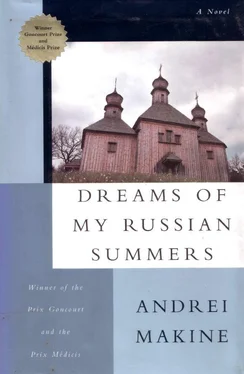Or perhaps this fragment as well: the one and only wedding photo (all the others, those in which my grandfather appeared, would be confiscated at the time of his arrest): their two faces, slightly inclined toward one another, and on the lips of an incredibly young and beautiful Charlotte the smiling reflection of the "petite pomme "…
Furthermore, in those long nocturnal narratives, all was not always clear to my childish ears. That sudden rush of blood to the head of Charlotte's father, for example… One day this respectable and wealthy doctor learns from one of his patients, a senior official in the police, that the big demonstration by workers, which at any minute was about to spill onto the main square at Boyarsk, would be met at one of the crossroads with machine-gun fire. As soon as his patient has left, Dr. Lemonnier removes his white coat and, without summoning his driver, leaps into his carriage and hurtles through the streets to warn the workers.
The massacre did not take place… And I often wondered why this "bourgeois," this privileged man, had acted thus. We were accustomed to seeing the world in black and white: the rich and the poor, the exploiters and the exploited – in a word, the class enemies and the just. Charlotte's father's action confused me. Out of the mass of humanity, so conveniently divided into two, suddenly arose a man, with his unpredictable liberty.
Nor did I understand what had happened at Bukhara. I guessed only that it was a terrible occurrence. It was surely not by chance that the adults only hinted at it, shaking their heads eloquently. It was a kind of taboo, which their narrative skirted around by describing the setting in the following way. First I saw a river flowing over smooth pebbles, then a path running beside the endless desert. And the sun began to dance in Charlotte's eyes, and her cheek was inflamed with the burning of the sand, and the heavens resounded with a neighing… The scene, the sense of which I did not understand but whose physical density I entered, was blotted out. The adults sighed, changed the subject, and poured themselves another glass of vodka.
In the end I sensed that this event, which had occurred in the sands of Central Asia, had marked our family's history forever in a mysterious and very intimate fashion. I also noticed that it was never spoken of when Charlotte's son, my uncle Sergei, was among the guests…
The truth is that if I spied on these nocturnal confidences it was, above all, to explore my grandmother's French past. The Russian side of her life interested me less. I was like that investigator who, in examining a meteorite, is primarily attracted by the little gleaming crystals embedded in its basalt surface. And just as one dreams of a distant journey whose goal is yet unknown, so I dreamed of Charlotte's balcony, of her Atlantis, where I believed I had left a part of myself the previous summer.
That summer I felt extremely nervous about encountering the tsar again… Yes, of seeing the young emperor and his wife once more in the streets of Paris. Just as you dread meeting a friend whose doctor has informed you of his imminent death and who, in blissful ignorance, proceeds to tell you all about his plans.
For how could I have traveled with Nicholas and Alexandra if I knew them to be doomed? If I knew that even their daughter Olga would not be spared? And that even the other children, to whom Alexandra had not yet given birth, would meet the same tragic fate?
I was secretly overjoyed that evening when I caught sight of a little collection of poems on my grandmother's lap that she was leafing through as she sat amid the flowers upon her balcony. Had she sensed my unease, remembering the incident of the previous summer? Or did she simply want to read us one of her favorite poems?
I came to sit beside her on the floor itself, resting my elbow on the head of the stone bacchante. My sister stood on the other side, leaning on the handrail, her gaze lost in the warm mist of the steppes.
Charlotte's voice was lyrical as the lines demanded:
There is a tune, for which I'd gladly part With all Rossini, Weber, and Mozart, An ancient air, whose languid melody Has secret charms that speak only to me…
The magic of this poem by Nerval conjured up out of the evening shadows a castle of the time of Louis XIII and the chatelaine, "Fair with dark eyes, in robe of ancient style."…
It was then that my sister's voice roused me from my poetic reverie: "And Félix Faure, what became of him?"
She was still standing there, at the corner of the balcony, leaning lightly over the handrail. With absentminded gestures from time to time she plucked at a faded morning glory bloom and tossed it away, watching its gyrations in the nocturnal air. Lost in her young girl's dreams, she had not listened to the reading of the poem. It was the summer of her fifteenth year… Why had she thought about the president? Probably this handsome and imposing man with an elegant mustache and great calm eyes suddenly became a focus, through some capricious play of her amorous daydreams, for her pictured reality of a man's presence. And she asked in Russian – as if better to express the disturbing mystery of this secretly desired presence – "And Félix Faure, what became of him?"
Charlotte threw me a rapid glance with a hint of a smile. Then she closed the book she was holding in her lap, sighed softly, and looked into the distance, toward that horizon where the previous year we had seen Atlantis emerging.
"Some years after the visit of Nicholas II to Paris, the president died…" There was a brief hesitation, an involuntary pause, which only served to increase our attentiveness. "He died suddenly, at the Elysée Palace. In the arms of his mistress, Marguerite Steinheil…"
It was this sentence that sounded the death knell for my childhood. "He died in the arms of his mistress…"
I was overwhelmed by the tragic beauty of these words. A whole new world swept over me.
What struck me above all about this revelation was the setting: this scene of love and death had been played out at the Elysée! At the presidential palace! At the pinnacle of that pyramid of power, of glory, of world fame… I pictured a sumptuous room with tapestries, gilt, rows of mirrors. In the midst of this luxury – a man (the president of the Republic!) and a woman, united in an ardent embrace…
Dumbfounded, I began unconsciously to translate the scene into Russian. That is, to replace the French protagonists with their national equivalents. A series of phantoms, looking cramped in their black suits, appeared before my eyes. Secretaries of the Politburo, masters of the Kremlin: Lenin, Stalin, Khrushchev, Brezhnev. Four very different characters, loved or detested by the population, each of whom had put his stamp on a whole epoch in the history of the empire. Yet they all had one quality in common: at their sides a feminine presence, let alone an amorous one, was inconceivable. It was far easier for us to imagine Stalin in the company of someone like Churchill at Yalta, or with Mao in Moscow, than to picture him with the mother of his children…
"The president died at the Elysée Palace, in the arms of his mistress, Marguerite Steinheil…" This sentence seemed like a coded message coming from another planetary system.
Charlotte went to the Siberian suitcase to look for some of the newspapers of the period, hoping to be able to show us a photo of Madame Steinheil. While I, embroiled in my erotic Franco-Russian translation, recalled a remark that I had heard one evening on the lips of a gangling dunce, a fellow pupil. We were walking along the dark corridors at school after a session of weight lifting, the only subject at which he excelled. Passing the portrait of Lenin, my companion had given a low whistle in a most disrespectful manner and had observed, "You know old Lenin. He didn't have any children, did he? 'Cause he just didn't know how to make love…"
Читать дальше












